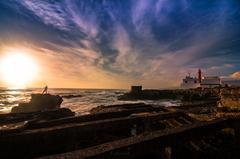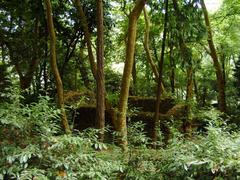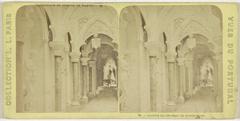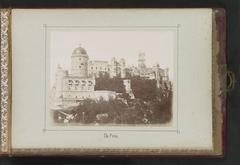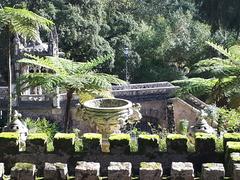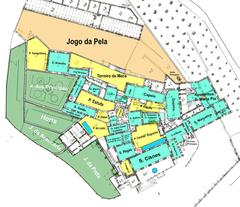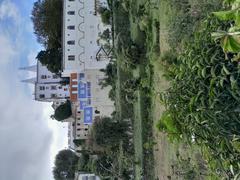Visiting Forte do Guincho: Hours, Tickets, and Tips
Date: 20/07/2024
Introduction
Forte do Guincho, situated in the Sintra municipality of Portugal, is a historic fortification that offers visitors a unique glimpse into the nation’s rich military history and architectural heritage. Built in the 17th century during the Restoration War, this fort was a crucial part of Portugal’s coastal defense system against pirate attacks and foreign invasions. Its strategic location on a cliff overlooking the Atlantic Ocean provided an ideal vantage point for monitoring and safeguarding the coastline. Today, Forte do Guincho stands as a cultural and historical landmark, attracting tourists from around the world who are eager to explore its well-preserved structures and enjoy its stunning views. The fort’s restoration and modern use as a cultural site allow visitors to immerse themselves in the history while appreciating the natural beauty of the Sintra-Cascais Natural Park (Visit Cascais, Sintra Myths and Legends, Visit Portugal).
Table of Contents
- Introduction
- History of Forte do Guincho
- Visitor Information
- Nearby Attractions
- Dining Options
- Accessibility
- Safety Tips
- Souvenirs and Shopping
- Environmental Responsibility
- FAQ
- Conclusion
- References
History of Forte do Guincho
Early Beginnings
Forte do Guincho, also known as Fort of Guincho, is a historical fortification located in the Sintra municipality of Portugal. The fort was constructed in the 17th century, during the reign of King John IV, as part of a broader strategy to defend the Portuguese coast from pirate attacks and foreign invasions. The construction of the fort began in 1642 and was completed in 1643, a period marked by the Restoration War, during which Portugal sought to regain its independence from Spain (Visit Cascais).
Architectural Design
The fort’s design is a testament to the military architectural style of the time. It features a star-shaped layout, which was a common design for fortifications in the 17th century. This design allowed for better defense against artillery attacks. The walls of the fort are thick and robust, built to withstand cannon fire. The fort also includes a central courtyard, barracks, and storage rooms for ammunition and supplies (Sintra Myths and Legends).
Strategic Importance
Forte do Guincho was strategically located to oversee Guincho Beach and the surrounding coastline. Its position allowed for a clear line of sight to the Atlantic Ocean, making it an ideal spot for monitoring incoming ships. The fort played a crucial role in the coastal defense system, working in conjunction with other nearby fortifications such as the Fort of São Julião da Barra and the Fort of São Lourenço do Bugio (Cascais Tourism).
Role in the Restoration War
During the Restoration War (1640-1668), Forte do Guincho was an active military installation. It served as a defensive outpost against Spanish forces and pirates who threatened the Portuguese coast. The fort’s cannons were used to deter enemy ships, and its garrison provided a quick response to any incursions. The fort’s presence contributed to the overall security of the region, ensuring safe passage for Portuguese ships and protecting local settlements (Portuguese Military History).
Decline and Abandonment
By the 19th century, the strategic importance of Forte do Guincho began to wane. Advances in military technology and changes in naval warfare rendered many coastal fortifications obsolete. The fort was gradually abandoned and fell into disrepair. By the early 20th century, it was no longer in use as a military installation and had become a relic of the past (Sintra Cultural Heritage).
Restoration and Modern Use
In the late 20th century, efforts were made to restore Forte do Guincho and preserve its historical significance. The fort was renovated and repurposed for modern use. Today, it serves as a cultural and historical site, attracting tourists and history enthusiasts. The fort’s restoration has allowed visitors to explore its architecture and learn about its role in Portugal’s coastal defense system (Visit Portugal).
Visitor Information
Visiting Hours
Forte do Guincho is open to visitors throughout the year. The visiting hours are typically from 10:00 AM to 6:00 PM from April to October, and from 10:00 AM to 5:00 PM from November to March. It is advisable to check the official website or contact the local tourism office for any changes in the schedule.
Ticket Prices
The entrance fee to Forte do Guincho is quite reasonable. Adults are charged €5, children (aged 6-12) €3, and seniors (65+) €4. Children under the age of 6 can enter for free. Guided tours are available for an additional fee and can be booked in advance (Visit Cascais).
Travel Tips
To make the most of your visit, wear comfortable shoes as the terrain can be uneven. Bring water and sun protection, especially during the summer months. Photography is allowed, so don’t forget your camera to capture the stunning views of the Atlantic Ocean.
Nearby Attractions
Cabo da Roca
Cabo da Roca is the westernmost point of mainland Europe, offering dramatic cliffs and stunning ocean views. It is located about 8 kilometers from Forte do Guincho (Cabo da Roca).
Praia do Guincho
Praia do Guincho is a popular beach known for its strong winds and excellent conditions for surfing and windsurfing. It is located just a short walk from the fort (Praia do Guincho).
Sintra
Sintra is a historic town renowned for its palaces, gardens, and UNESCO World Heritage sites, including the Pena Palace and the Moorish Castle (Sintra).
Dining Options
There are several dining options near Forte do Guincho, ranging from casual beachside cafes to fine dining restaurants. One of the most renowned establishments is the Fortaleza do Guincho restaurant, located within the fort itself. It offers a gourmet dining experience with a focus on fresh seafood and traditional Portuguese cuisine. Reservations are recommended, and more information can be found on their official website.
Accessibility
Forte do Guincho is partially accessible to visitors with mobility issues. The main entrance and some areas within the fort are wheelchair accessible, but certain sections with steep stairs and uneven terrain may pose challenges. It is advisable to contact the fort’s administration in advance to discuss specific accessibility needs. The Sintra Parks website provides contact details and further information on accessibility.
Safety Tips
While Forte do Guincho is generally safe for visitors, it is important to exercise caution, especially near the cliff edges and rocky areas. The coastal winds can be strong, and the rocks can be slippery. Always stay within designated paths and barriers, and supervise children closely. In case of emergencies, the nearest medical facility is the Hospital de Cascais, located about 15 kilometers away. The hospital’s website provides contact information and directions.
Souvenirs and Shopping
A small gift shop is located near the entrance of Forte do Guincho, offering a variety of souvenirs, including postcards, books, and locally made crafts. For a wider selection of shopping options, consider visiting the nearby town of Cascais, which has numerous boutiques, markets, and artisan shops. The Cascais Tourism website provides a comprehensive guide to shopping in the area.
Environmental Responsibility
Visitors are encouraged to respect the natural environment and cultural heritage of Forte do Guincho. This includes disposing of trash properly, avoiding damage to historical structures, and not disturbing local wildlife. The fort is part of the Sintra-Cascais Natural Park, and preserving its beauty and integrity is a shared responsibility. For more information on sustainable tourism practices, visit the Sintra Parks website.
FAQ
Q: What are the visiting hours for Forte do Guincho? A: The fort is open from 10:00 AM to 6:00 PM from April to October, and from 10:00 AM to 5:00 PM from November to March. Check the Sintra Tourism website for any updates.
Q: How do I get tickets for Forte do Guincho? A: Tickets can be purchased at the entrance. Adults pay €5, children (aged 6-12) €3, and seniors (65+) €4. Children under 6 enter for free.
Q: Are guided tours available at Forte do Guincho? A: Yes, guided tours are available in English and Portuguese and typically last about 1 hour. The cost is around €10 per person.
Q: Is Forte do Guincho accessible to visitors with mobility issues? A: The fort is partially accessible, with the main entrance and some areas wheelchair accessible. However, certain sections may pose challenges.
Q: What should I wear when visiting Forte do Guincho? A: Wear comfortable clothing and sturdy walking shoes. A light jacket or windbreaker is recommended due to strong coastal winds.
Conclusion
Forte do Guincho is more than just a historical fort; it is a testament to Portugal’s resilience and strategic ingenuity during a pivotal period in its history. From its 17th-century origins as a coastal defense fortification to its present-day status as a cultural and historical site, Forte do Guincho encapsulates the rich maritime heritage of Portugal. Visitors are treated to a comprehensive experience that combines historical insights, architectural marvels, and breathtaking natural scenery. The fort’s ongoing preservation efforts ensure that it remains a valuable cultural asset for future generations. Whether you’re a history enthusiast, a nature lover, or simply seeking a unique travel experience, Forte do Guincho offers something for everyone. Don’t miss the opportunity to explore this remarkable site and its surrounding attractions, and be sure to check for any special events or guided tours to enhance your visit (Portuguese Military History, Heritage Portugal, Sintra Cultural Heritage).
References
- Visit Cascais. (n.d.). Retrieved from https://www.visitcascais.com
- Sintra Myths and Legends. (n.d.). Retrieved from https://www.sintramythsandlegends.com
- Cascais Tourism. (n.d.). Retrieved from https://www.cascais.pt
- Portuguese Military History. (n.d.). Retrieved from https://www.portuguesemilitaryhistory.com
- Sintra Cultural Heritage. (n.d.). Retrieved from https://www.sintraculturalheritage.pt
- Visit Portugal. (n.d.). Retrieved from https://www.visitportugal.com
- Cabo da Roca. (n.d.). Retrieved from https://www.visitportugal.com/en/content/cabo-da-roca
- Praia do Guincho. (n.d.). Retrieved from https://www.visitportugal.com/en/content/praia-do-guincho
- Sintra. (n.d.). Retrieved from https://www.visitportugal.com/en/destinos/lisboa-regiao/73898
- CP - Comboios de Portugal. (n.d.). Retrieved from https://www.cp.pt/passageiros/en
- Fortaleza do Guincho. (n.d.). Retrieved from https://www.fortalezadoguincho.com/
- Hospital de Cascais. (n.d.). Retrieved from https://www.hospitaldecascais.pt/
- Cascais Tourism. (n.d.). Retrieved from https://www.visitcascais.com/en
- Sintra Parks. (n.d.). Retrieved from https://www.parquesdesintra.pt/en/

